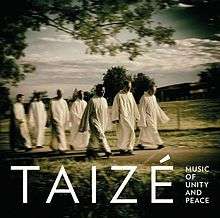Taizé - Music of Unity and Peace
| Taizé - Music of Unity and Peace | |
|---|---|
 | |
| Studio album by Taizé Community | |
| Released | March 16, 2015 |
| Recorded | May and July 2014 |
| Venue |
Romanesque Church, Taizé Church of Reconciliation, Taizé |
| Genre | choral, Christian, sacred |
| Length | 67:48 |
| Language | Latin, French, English, Italian, German, Church Slavonic, Spanish |
| Label | Deutsche Grammophon (Universal Music) |
| Producer | Anna Barry |
Taizé - Music of Unity and Peace is the 2015 studio album by the ecumenical Taizé Community from the eponymous village in France. It was recorded in May and July 2014, and was released in March 2015, by the Deutsche Grammophon.
Background
The Taizé Community is an ecumenical monastic order in Taizé, Saône-et-Loire, Burgundy, France. It is composed of more than one hundred brothers, from Protestant and Catholic traditions, who originate from about thirty countries across the world. It was founded in 1940 by Brother Roger Schütz, who came to Taizé from Geneva. Guidelines for the community’s life are contained in The Rule of Taizé[1] written by Brother Roger and first published in French in 1954.
Musical style
The music of Taizé emphasizes simple phrases, usually lines from Psalms, other pieces of Scripture, or from the liturgy, both Western and Eastern Orthodox, repeated many times and sometimes also sung in canon.[2] Earlier Taizé community music was conceived and composed by Jacques Berthier.[3] Later Joseph Gelineau became a major contributor to the music.[3] More recent songs have been composed by brothers of the Community.
Recording
The recording took place in May and in July 2014. Most of the chants were recorded in the Church of Reconciliation in Taizé, by a few instrumentalists and a choir composed of young people from different countries who spent a week in the Community. Several chants were recorded by brothers of the Community, in the Romanesque Church in the village of Taizé.[4][5][6] The recording was produced by Anna Barry.[7]
The chants on the album are sung in seven different languages: Latin, French, English, Italian, German, Church Slavonic and Spanish. The Community considers that the songs in many different languages are appropriate for large international gatherings.[2]
Track listing
| No. | Title | Lyrics | Music | Length |
|---|---|---|---|---|
| 1. | "The Bells Of Taizé" | 2:13 | ||
| 2. | "Veni, Sancte Spiritus" | liturgical | Jacques Berthier | 5:38 |
| 3. | "Introduction: Seigneur, ouvre mes lèvres" | Ps 50 | Jacques Berthier | 1:32 |
| 4. | "Bless the Lord" | Ps 104,1 | Jacques Berthier | 4:06 |
| 5. | "Laudate Dominum" | Ps 117,1 | Jacques Berthier | 3:54 |
| 6. | "Répons: Le Verbe s'est fait chair" | Jn 1,14 | Taizé | 2:35 |
| 7. | "Beati voi poveri" | Mt 5,3; Lk 6,20 | Taizé | 4:51 |
| 8. | "Jubilate, coeli (Christus)" | liturgical | Jacques Berthier | 2:57 |
| 9. | "Psaume 63" | Ps 63 | Joseph Gelineau | 2:39 |
| 10. | "Bleiber hier" | Mk 14,34; Mt 26,36b.38.41 | Jacques Berthier | 5:35 |
| 11. | "In manus tuas, Pater" | Lk 23,46 | Taizé | 4:22 |
| 12. | "Surrexit Christus" | liturgical | Jacques Berthier | 3:35 |
| 13. | "Gospodi pomiluj C" | liturgical | Russian Orthodox Liturgy | 2:29 |
| 14. | "Aber du weißt den Weg für mich" | Dietrich Bonhoeffer | Taizé | 3:33 |
| 15. | "Cantique de Siméon" | Lk 2, 29-32 | Jacques Berthier | 1:46 |
| 16. | "Jésus le Christ" | Lk 11,35 | Jacques Berthier | 4:27 |
| 17. | "De noche iremos" | Luis Rosales | Jacques Berthier | 4:29 |
| 18. | "Ubi caritas et amor" | liturgical; 1 Jn 4,7 | Jacques Berthier | 3:01 |
| 19. | "Let All Who Are Thirsty Come" | Is 55,1 | Taizé | 4:06 |
| Total length: | 1:07:48[7][8] | |||
Release history
| Country | Date | Format | Label |
|---|---|---|---|
| Austria, Germany[9] | 13 March 2015 | Deutsche Grammophon (Universal Music) | |
| United Kingdom[10] | 16 March 2015 | ||
| Canada[11] | 17 March 2015 | ||
| Italy[12] | |||
| United States[13] | |||
| Japan[14] | |||
References
- ↑ English translation republished by SPCK in 2012
- 1 2 Prayer and Song, Official Taizé Community Website
- 1 2 "Taize Worship". Retrieved 2009-03-21.
- ↑ "Taize Releases "Music of Unity and Peace"". Retrieved 2015-03-11.
- ↑ "Taizé - Music of Unity and Peace (Album trailer long)". Retrieved 2015-03-11.
- ↑ "Im Zeichen des internationalen Friedenstages: Taizé und Deutsche Grammophon kündigen Jubiläumsalbum an". Retrieved 2015-03-11.
- 1 2 "Deutsche Grammophon - Taize "Music of Unity and Peace"". Retrieved 2015-03-11.
- ↑ "Gesängen aus Taizé - Liederverzeichnis". Retrieved 2015-03-11.
- ↑ "Taizé - Music of Unity and Peace". amazon.de. Retrieved 13 March 2015.
- ↑ "Music of Unity and Peace". Amazon.co.uk.
- ↑ "Music of Unity and Peace". Amazon.ca.
- ↑ "Music of Unity and Peace". Amazon.it.
- ↑ "Music of Unity and Peace". Amazon.com.
- ↑ "Music of Unity and Peace". Amazon.co.jp.